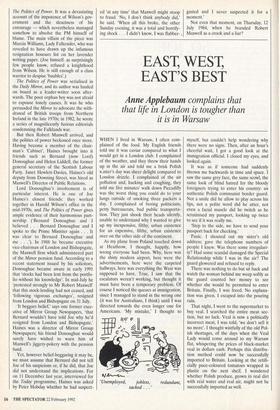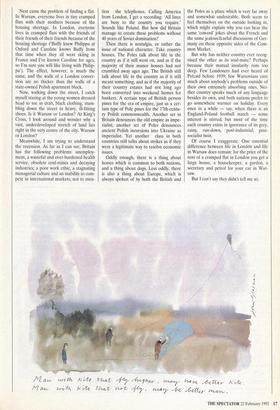EAST, WEST, EAST'S BEST
Anne Applebaum complains that
that life in London is tougher than it is in Warsaw
WHEN I lived in Warsaw, I often com- plained of the food. My English friends told me it was caviar compared to what I would get in a London club. I complained of the weather, and they threw their hands up in the air and told me a brisk Polish winter's day was sheer delight compared to London drizzle. I complained of the air pollution and, hacking and coughing, they told me five minutes' walk down Piccadilly was the worst thing you could do to your lungs outside of smoking three packets a day. I complained of boring politicians, petty bureaucrats, bad public transporta- tion. They just shook their heads silently, unable to understand why I wanted to give up my inexpensive, filthy, urban existence for an expensive, filthy, urban existence over on the other side of the continent.
As my plane from Poland touched down at Heathrow, I thought, happily, how wrong everyone had been. Why, here was the shiny modern airport, here were the advertisements, here were the carpeted hallways, here was everything the West was supposed to have. True, I saw that the escalators weren't working, but thought it must have been a temporary problem. Of course I noticed the queues at immigration, since I managed to stand in the wrong one (it was for Australians, I think) until I was directed towards the even longer one for Americans. 'My mistake,' I thought to 'Unemployed, jobless, redundant, sacked . . myself, but couldn't help wondering why there were no signs. Then, after an hour's cheerful wait, I got a good look at the immigration official. I closed my eyes, and looked again.
It was as if someone had suddenly thrown me backwards in time and space. I saw the same grey face, the same scowl, the same look of blind hatred for the bloody foreigners trying to enter his country: an authentic Polish communist border guard. Not a smile did he allow to play across his lips, not a polite word did he utter, not even a facial muscle did he twitch as he scrutinised my passport, looking up twice to see if it was really me.
`Step to the side, we have to send your passport back for checking.'
Panic. I shouted out my sister's old address; gave the telephone numbers of people I knew. Was there some irregulari- ty? Had some scandal damaged the Special Relationship while I was in the air? The guard glowered and refused to reply.
There was nothing to do but sit back and watch the woman behind me weep softly as the guard counted her money to see whether she would be permitted to enter Britain. Finally, I was freed. No explana- tion was given. I escaped into the pouring rain.
That night, I went to the supermarket to buy veal. I searched the entire meat sec- tion, but no luck. Veal is now a politically incorrect meat, I was told, 'we don't sell it no more'. I thought wistfully of the old Pol- ish shortages, of the days when the Veal Lady would come around to my Warsaw flat, whispering the prices of black-market veal in dollars cash. Perhaps this distribu • tion method could now be successfully imported to Britain. Looking at the artifi- cially puce-coloured tomatoes wrapped in plastic on the next shelf, I wondered whether Polish produce, grown in real dirt with real water and real air, might not be successfully imported as well. Next came the problem of finding a flat. In Warsaw, everyone lives in tiny cramped flats with their mothers because of the housing shortage. In London, everyone lives in cramped flats with the friends of their friends of their friends because of the housing shortage (`Buffy knew Philippa at Oxford and Caroline knows Buffy from that time when they all went skiing in France and I've known Caroline for ages, so I'm sure you will like living with Philip- pa'). The effect, however, is much the same, and the walls of a London conver- sion are no thicker than the walls of a state-owned Polish apartment block.
Now, walking down the street, I catch myself staring at the young women dressed head to toe in drab, black clothing, stum- bling down the street in heavy, ill-fitting shoes. Is it Warsaw or London? At King's Cross, I look around and wonder why a vast, underdeveloped stretch of land lies right in the very centre of the city. Warsaw or London?
Meanwhile, I am trying to understand the recession. As far as I can see, Britain has the following problems: unemploy- ment, a wasteful and over-burdened health service, obsolete coal-mines and decaying industries; a poor work ethic, a stagnating managerial culture and an inability to com- pete in international markets, not to men-
tion the telephones. Calling America from London, I get a recording: 'All lines are busy to the country you require.' Sounds like Poland. But how did Britain manage to create these problems without 40 years of Soviet domination?
Then there is nostalgia, or rather the issue of national character. Take country houses. The Poles talk about life in the country as if it still went on, and as if the majority of their manor houses had not crumbled away ages ago. The British still talk about life in the country as if it still meant something, and as if the majority of their country estates had not long ago been converted into weekend homes for bankers. A certain type of British person pines for the era of empire, just as a cer- tain type of Pole pines for the 17th-centu- ry Polish commonwealth. Another set in Britain denounces the old empire as impe- rialist; another set of Poles denounces ancient Polish incursions into Ukraine as imperialist. Yet another class in both countries still talks about strikes as if they were a legitimate way to resolve economic issues.
Oddly enough, there is a thing about horses which is common to both nations, and a thing about dogs. Less oddly, there is also a thing about Europe, which is always spoken of by both the British and the Poles as a place which is very far away and somewhat undesirable. Both seem to feel themselves on the outside looking in, which might explain why you can hear the same `coward' jokes about the French and the same jealous/fearful discussions of Ger- many on these opposite sides of the Com- mon Market.
But why has neither country ever recog- nised the other as its soul-mate? Perhaps because their mutual insularity runs too deep. Few Londoners had ever heard of Poland before 1939; few Warsovians care much about anybody's problems outside of their own extremely absorbing ones. Nei- ther country speaks much of any language besides its own, and both nations prefer to go somewhere warmer on holiday. Every once in a while — say, when there is an England-Poland football match — some interest is stirred, but most of the time each country exists in ignorance of its grey, rainy, run-down, post-industrial, post- socialist twin.
Of course I exaggerate. One essential difference between life in LondOn and life in Warsaw does remain: for the price of the rent of a cramped flat in London you get a large house, a housekeeper, a garden, a secretary and petrol for your car in War- saw.
But I can't say they didn't tell me so.



















































 Previous page
Previous page